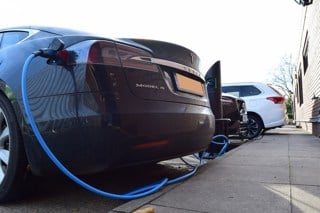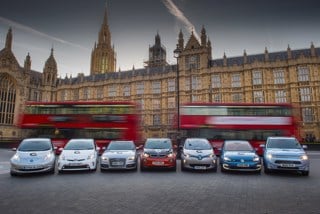By Erik Fairbairn, Pod Point CEO and founder
Following industry’s repeated requests for clarity, HM Treasury announced the next three years’ company car tax benefit in kind (BIK) rates for full battery electric vehicles (BEVs) - and they’re remarkable.
Company car drivers choosing a pure electric vehicle will pay no benefit-in-kind (BIK) tax in 2020/21. The rate will increase to 1% in 2021/22 and 2% in 2022/23.
Until now the 2020/21 rate was expected to be 2%, while the following years’ rates were still to be confirmed. So this new BiK regime came as an exciting surprise.
To the untrained eye these changes might seem dry, but their impact on the attractiveness of the cleanest electric vehicles cannot be overstated.
Put simply, from April next year, company car drivers are going to have the choice of any BEV for a monthly BiK contribution of precisely zero, or paying £200+ a month in BIK for an ICE car.
By way of example, a mid-range 1.5l Ford Focus diesel will cost employees a monthly tax contribution of £230 per month in BIK payments, which will steadily increase year on year.
A Hyundai Kona Electric, conversely, which has a range of 279 miles, will necessitate a monthly BIK contribution of £0 in 2020/21, followed by approximately £12.50 per month in 2021/22 and around £25 per month in 2022/23.
At the executive end the changes are even more pronounced, a Mercedes S450 L AMG, for example, will require monthly BIK contributions of almost £1,100 per month, climbing slightly over the three years; while a Tesla Model S Performance, which has a range of 365 miles and a 0-60 speed of under 3 seconds, will cost employees £0 in BIK in 2020/21, followed by circa £30 per month in 2021/22 and £60 per month in 2022/23*.
This isn’t just price parity for BEVs, it is a massive financial advantage for those employees choosing the full electric option. And, when you consider even those who don’t have a company car supplied to them can potentially take advantage of salary sacrifice arrangements to obtain a significant discount, it seems reasonable to expect BEV demand from company car and grey fleet drivers to rocket.
And that means a huge leap forward for the electrification of the UK’s car fleet at large. The commercial fleet and company car market is the primary driver of new registrations for cars. During 2018, 57.3% of all first registrations of cars were made by companies. These company cars then become affordable second hand cars that allow the private driver to grab an electric bargain.
But perhaps the most important function of this announcement is to stimulate supply of high range, affordable BEVs from the major OEMs.
The supply of vehicles is already outstripped by demand in this segment, with the likes of the Kia e-Niro production allocation selling out in a handful of days and widespread reports of long waiting lists.
Pressing the demand to these levels makes the case for major production investments truly compelling.
When we finally retire the last petrol filling pump, this announcement may well be seen as one of the major turning points on that journey.
* Figures assume 40% tax bracket.
See the new BIK company car tax rates.



















Login to comment
Comments
No comments have been made yet.